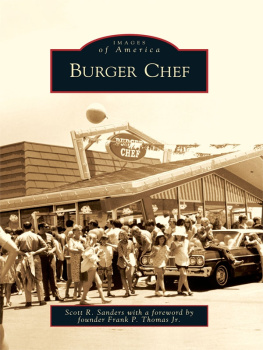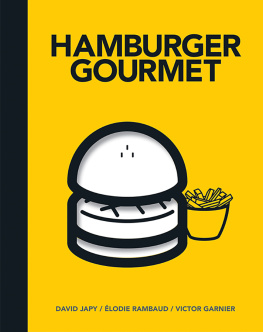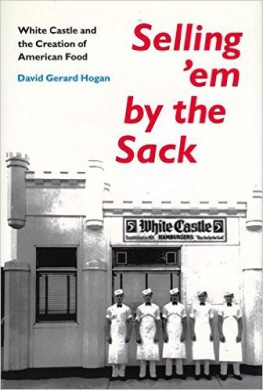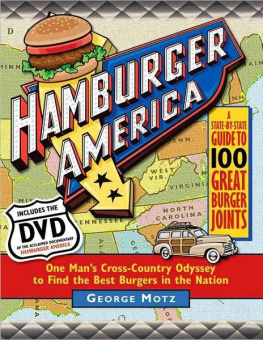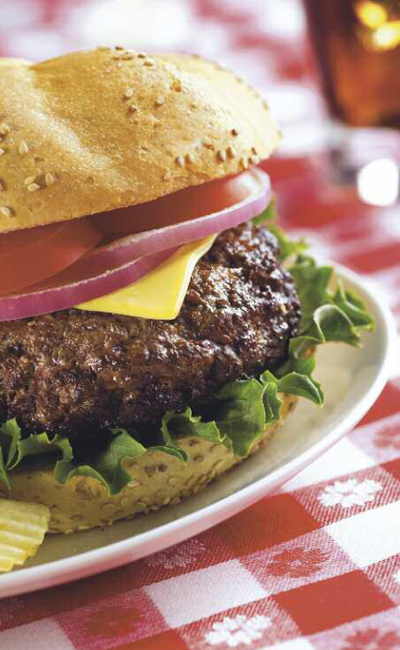Introduction

My first recollection of eating away from home was at a little hamburger stand across the street from a park in Sunland, California, where I spent my early years. Fifty-eight years later I can still remember the portly elderly proprietor, his white apron splotched with grease, ketchup and mustard. His compact lunch wagon, fitted with a grill for cooking the beef patties, was hardly big enough to contain his bulk. I dont recall side orders, cold drinks, desserts or French fries just the hamburgers. Our family always ordered five hamburgers, at a total cost of one dollar quite a bargain in 1950. As far as I can remember, we were his only customers, which was just as well because he took at least ten minutes to cook, garnish and wrap our burgers. When youre four years old and hungry, ten minutes can be an eternity. We ate in the car or at picnic bench, and then ran back to play in the park.
My memories of the neighbourhood hamburger vendor were eclipsed five years later by my first visit to McDonalds. Compared with the little cart in the park, McDonalds was a dazzling palace. The building was clean, spacious, colourful and brightly lit. Through the forward-tilting glass faade where we placed our order, the staff clean-cut teenage boys could be seen going about their tasks with quasi-military precision. There were lots of people queuing but service was speedy and the waiting time was brief. The menu was very limited hamburgers, cheeseburgers, French fries, malts or fizzy drinks but it was exactly what the customers wanted. Whats more, the food was cheap: you could get an entire meal for less than 50 cents, and a family of four could be reasonably sated for under three dollars.
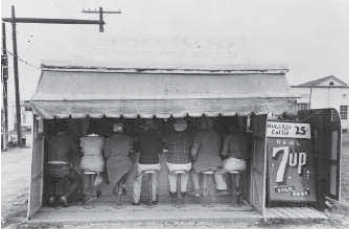
Hamburger stands were often outdoors, where customers were covered only with an awning, such as the one above in Harlingen, Texas, 1939.
The billboard outside proudly announced that McDonalds had sold over a million hamburgers. To me, this was simply an unimaginable quantity and, frankly, I didnt believe it. At the time, McDonalds had just started franchising, and there were only a dozen or so outlets in the Los Angeles area. It was inconceivable that such a small chain could have served so many burgers in such a short time.
Times have changed, and so has my perception of McDonalds. Sixty years after its founding, in 1948, as a small octagonal restaurant on E Street in San Bernardino,California, McDonalds is a massive multinational conglomerate with more than 30,000 restaurants and an estimated 250,000 employees worldwide. Their signs now boast that they have sold more than 100 billion hamburgers, which works out to about sixteen burgers for every person alive in the world today.
The hamburger sandwich first appeared in the United States as a minor street food in the late nineteenth century. Within just a few decades the succulent sandwich became the focus of a whole new food distribution model: the fast-food industry, which revolutionized the way Americans ate. From its birthplace, the hamburger was introduced to other countries, and by the late twentieth century it was the foundation of one of the fastest-growing businesses in the world.
The hamburgers rise to global prominence is a lively story, peopled with short-order cooks and top-flight chefs, street vendors and captains of industry, family-run diners and massive conglomerates, burger barons and vegetarians, hard-hitting advertisers and health-food advocates, fast-food freaks and slow-food purists, hard-nosed critics and flavour-conscious aficionados. The hamburger sandwich has achieved this success through its adaptability to local cultures and tastes, and in the process it has changed the world.
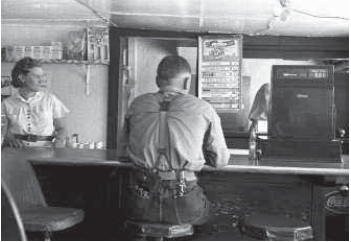
Interior of a small hamburger stand in the 1930s, Alpine, Texas, 1939.
Hamburger Fakelore
Like so many other matters related to culinary history, the hamburgers origins are shrouded in fakelore. The Tartars had nothing to do with the hamburger; the citizens of Hamburg, Germany, had only a remote connection with the sandwich. There are several contenders for the title of inventor of the hamburger sandwich, but no primary evidence has surfaced to support any of their claims. The frequently cited Delmonicos menu, dated 1834 and featuring Hamburg Steak, is a fake. The oft-quoted 1904 newspaper story about the hamburger vendor at the Louis and Clark Exposition in St Louis who supposedly invented the hamburger sandwich has not been identified, and even if it were, it would clearly not be the first instance of a hamburger sandwich in America. Ray Kroc did not found McDonalds and the first McDonalds restaurant was not in Des Plaines, Illinois.
1
Humble Hamburger
Beginnings

In November 2006, Representative Betty Brown introduced a resolution into the Texas Legislature that formally designated Athens, Texas, as the Original Home of the Hamburger. She based her resolution on the belief that Fletcher Davis had invented the hamburger at his lunch counter in Athens sometime during the 1880s. Hearings were held on this resolution, and it passed the Texas legislature in March 2007. Not to be outdone, the Wisconsin state legislature passed a resolution in August 2007 proclaiming Charlie Nagreen as the inventor of the hamburger and the town of Seymour as the real Home of the Hamburger. Other prominent contenders who have been proclaimed inventors of the hamburger include the brothers Frank and Charles Menches, who reportedly served up the first burger sandwich in 1885 at the Erie County Fair in New York, and Louis Lassen of New Haven, Connecticut, who is credited for doing so around 1900.





